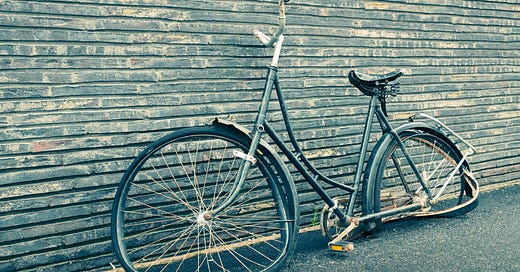When I teach design thinking, the most important lesson I teach is prototyping. I make some time to teach about prototyping even when the client’s main needs lie elsewhere — it’s that important. Because I think prototyping is the most effective way to get people who aren’t in school to accept a mindset of learning, and a mindset of learning is one of the most effective ways to deal with the rigors of life.
I speak from experience. This is where I tell you that as of this writing, I am not sure that I can ride a bike. That expression “it’s just like riding a bike”? Doesn’t mean anything to me.
How can I not be sure? Shouldn’t the answer be “yes” or “no”? I know I “learned” to ride several times as a kid, but then somehow had to learn again when I was older. The training wheels came on, went back on, came off again. And somehow I never went riding after that, never built up a habit that stuck to my identity. I won’t unpack all of these strange experiences in detail, but I know it must have something to do with the trauma of my parents’ divorce and its aftermath. Something about the category itself is corrupted.
I had been meaning to answer the question before my son gets old enough to ride, so I gave it a shot at the park the other day. They had one of those rental bike services, so I checked one out while he went down the slide. I kicked back the kickstand and started pedaling, but the pedals kept locking up. I was seriously discouraged — this wasn’t just hard, but totally different from how I remembered it. If it was this hard, I didn’t want to do it while also trying to watch my kid.
Then I realized what had happened: when I had unlocked the bike, I hadn’t put away the plastic cord that connects it to the station. It had gotten mixed up with the gears as soon as I started pedaling. And because I was missing the intuitive sense that something was wrong, I kept pushing, making a bigger and bigger mess.
Knowing it would take a minute to fix, I called over my son to “help” me with the puzzle of the cord. While I unraveled it, I told him the same things I often tell clients when they are prototyping. “Not being able to do something is a part of learning…” “Sometimes when we go exploring we find things we don’t expect…” My son is even empathetic enough now that he told me I’d do better next time. He’d help push, he said. As I stood up, I felt like I had this learning mindset thing down.
But then I felt a sharp pain in my chest. The closest thing I can compare it to is taking a soccer ball to the chest when I was a kid. It felt like I couldn’t stand up all the way. I told my son we needed to go to the water fountain. I worried about what would happen to him if I was having a heart attack. Once I took a drink, though, I was fine. We made our way back to the car.
I am still not sure what happened to me physically, but I know what had happened emotionally: I was letting go of the shame around the bike. It became clear to me that even if I never learned properly as a kid, there are a dozen different ways I can learn now. I could take a class, ask a friend, buy a junker and mess around in a parking lot. Or even go back to the same exact spot and try it again, knowing what I know now. It doesn’t matter how it went down when I was a kid or whether I’m any good as an adult. Like Mister Rogers, I can have fun doing a thing even if I’m not very good at it.
This is the full spectrum of what I mean by learning through failure, and it informs all the advice I give clients and students trying to do this. Sometimes learning is a detailed analysis of every decision in the life of a project. But sometimes it’s also a pain in the chest from not even starting the prototype — then realizing that’s okay after all. It’s part of the reason why I put together a coaching package designed entirely to make sense of failure. The pain of failure gives us the most important opportunities to learn, but also some of the most important moments of liberation for ourselves.




Hey make sure you watch that Mister Rogers video. He says more about what it's actually like to prototype here than I could ever teach. https://www.tiktok.com/@madammome/video/7114317277578661162
"to make sense of failure" is made even harder when living in an either/or culture. That sets up the impossible option of success or failure. If we lived in a both/and culture, then success and failure would guide our learning experience. Unfortunately the either/or culture tends to attach negative emotions like shame and guilt to failure. Those can be difficult feelings to overcome.